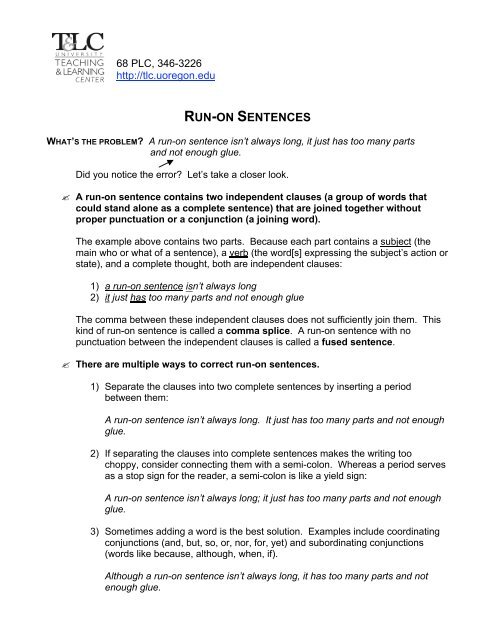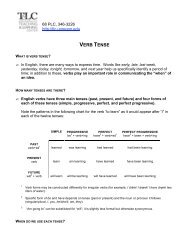RUN-ON SENTENCES
RUN-ON SENTENCES
RUN-ON SENTENCES
Create successful ePaper yourself
Turn your PDF publications into a flip-book with our unique Google optimized e-Paper software.
68 PLC, 346-3226<br />
http://tlc.uoregon.edu<br />
<strong>RUN</strong>-<strong>ON</strong> <strong>SENTENCES</strong><br />
WHAT’S THE PROBLEM? A run-on sentence isn’t always long, it just has too many parts<br />
and not enough glue.<br />
Did you notice the error? Let’s take a closer look.<br />
A run-on sentence contains two independent clauses (a group of words that<br />
could stand alone as a complete sentence) that are joined together without<br />
proper punctuation or a conjunction (a joining word).<br />
The example above contains two parts. Because each part contains a subject (the<br />
main who or what of a sentence), a verb (the word[s] expressing the subject’s action or<br />
state), and a complete thought, both are independent clauses:<br />
1) a run-on sentence isn’t always long<br />
2) it just has too many parts and not enough glue<br />
The comma between these independent clauses does not sufficiently join them. This<br />
kind of run-on sentence is called a comma splice. A run-on sentence with no<br />
punctuation between the independent clauses is called a fused sentence.<br />
There are multiple ways to correct run-on sentences.<br />
1) Separate the clauses into two complete sentences by inserting a period<br />
between them:<br />
A run-on sentence isn’t always long. It just has too many parts and not enough<br />
glue.<br />
2) If separating the clauses into complete sentences makes the writing too<br />
choppy, consider connecting them with a semi-colon. Whereas a period serves<br />
as a stop sign for the reader, a semi-colon is like a yield sign:<br />
A run-on sentence isn’t always long; it just has too many parts and not enough<br />
glue.<br />
3) Sometimes adding a word is the best solution. Examples include coordinating<br />
conjunctions (and, but, so, or, nor, for, yet) and subordinating conjunctions<br />
(words like because, although, when, if).<br />
Although a run-on sentence isn’t always long, it has too many parts and not<br />
enough glue.
WHY IS THIS ERROR SO COMM<strong>ON</strong>?<br />
Because the independent clauses in most run-on sentences express ideas that are<br />
closely related, writers sometimes have difficulty distinguishing where one idea ends<br />
and the next begins. Familiarity with spoken language offers little help since speech<br />
may move seamlessly from one idea to the next without acknowledging boundaries<br />
between independent clauses. Writers who rely on their “ear” for language may not be<br />
able to “hear” the error.<br />
Transition words like however, therefore, next, then, and consequently are often<br />
confused with conjunctions. These words do create a relationship between ideas;<br />
however, unlike conjunctions, they do not sufficiently join two independent clauses.<br />
HOW CAN WE IDENTIFY <strong>RUN</strong>-<strong>ON</strong> <strong>SENTENCES</strong>?<br />
TRY IT!<br />
Take a close look at sentences that express more than one idea. Does each idea<br />
contain a subject and a verb? Can each idea stand alone as a complete sentence? If<br />
you’re not sure, add “I realize” to the beginning of each idea. If it sounds right with “I<br />
realize” in front of it, it probably is an independent clause. <br />
I’m not ready to get a cat plants are hard enough to take care of.<br />
Are there two ideas? Yes. Could they stand alone as complete sentences? Let’s try<br />
the “I realize” tip.<br />
I realize I’m not ready to get a cat.<br />
I realize plants are hard enough to take care of.<br />
Yes, they could be complete sentences. Separating the parts into two sentences is<br />
one possible correction:<br />
I’m not ready to get a cat. Plants are hard enough to take care of.<br />
Remember, though, that a sentence can contain more than one idea as long as the<br />
ideas are sufficiently joined. Here are two other possible corrections:<br />
I’m not ready to get a cat; plants are hard enough to take care of.<br />
OR<br />
I’m not ready to get a cat because plants are hard enough to take care of.<br />
If most of your run-ons are comma splices, pay particular attention to commas when<br />
you proofread. Are any of them separating independent clauses? <br />
Are you ready to try out these techniques? Identify and revise the run-on sentences in<br />
this passage:<br />
Some people dislike rainy days, however Miranda loves them. She takes long walks<br />
in the rain whenever she gets a chance, and she doesn’t use an umbrella or wear a
jacket because she likes the feel of cool raindrops on her skin. Her grandmother often<br />
tells her, “You should stay inside, you’ll catch a cold!” When Miranda finally does<br />
come inside, she curls up with a good book, drinks hot cocoa, and listens to the rain<br />
on the roof. Such days are wonderful she wishes tomorrow weren’t Monday!



